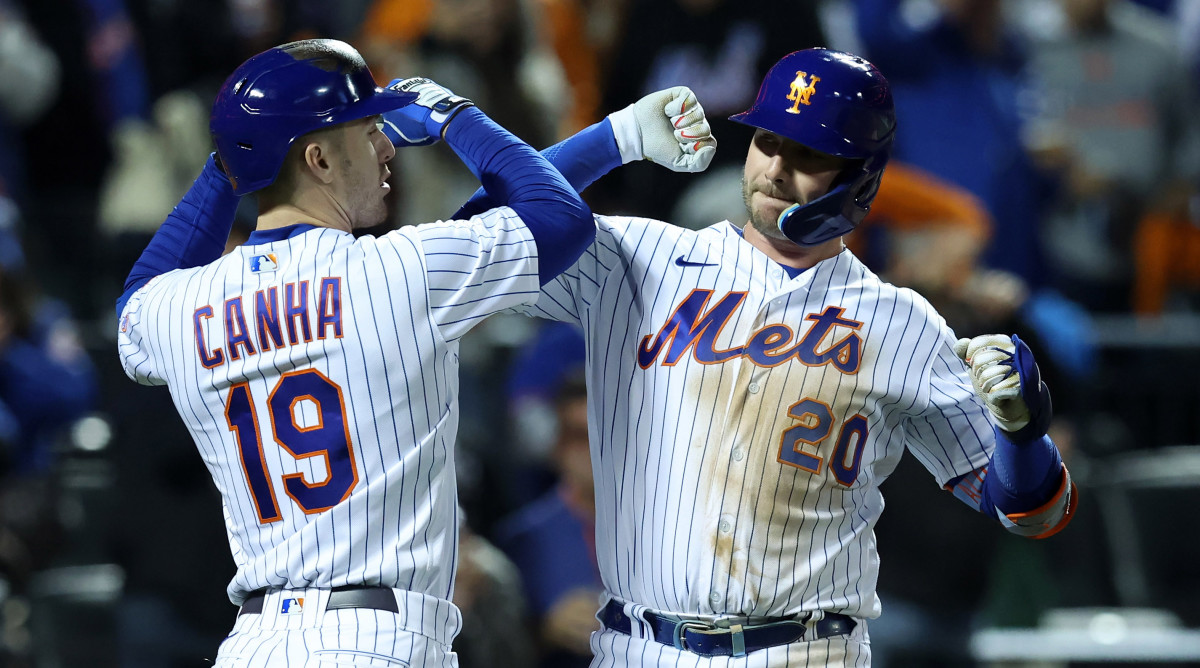The Mets Just Might Be Enough
NEW YORK — Heading into Game 2 of the National League wild-card series, the Mets had been reminding themselves who they are: the Mets. Once that designation might have brought scorn. But now it connoted a 101-win team composed of a starting rotation that struck out batters more often than any other (9.42 per nine innings), the best closer in the sport (Edwin Díaz, whose 50.2% strikeout rate is tied for the best in history, minimum 60 innings) and a lineup that finished second in the NL in on-base percentage (.332, one point behind the Dodgers).
So when they told one another to play like the Mets, that meant play confidently. And it meant win.
They brought it up in hitters’ meetings, in the clubhouse, in the dugout.
“It was just a lot of just good ball talk amongst the fellas,” said first baseman Pete Alonso.
So in the wake of Saturday’s 7–3 victory over the Padres to force a winner-take-all Game 3, they had two things to celebrate: that they had won, and that they had done it the way they had all season.
“We've been trying to play like ourselves,” said shortstop Francisco Lindor. “It's just baseball. We have good days. We have bad days. We try to eliminate as many bad days as possible and try to have more good days. Today we played very Mets-like. We put the ball in play. We run the bases right. We play good defense. We pitch. We stay together, and we win together.”
Indeed, ace Jacob deGrom struggled with his arsenal but completed six innings of two-run ball, the last few innings mostly with offspeed stuff because he lost faith in his triple-digit fastball. Díaz entered in the seventh inning and recorded five outs. And perhaps most heartening of all, the hitters hit.

It was not at all clear early in the game that that would be the case. Lindor hit a solo home run in the first, but the Mets put six men on base in the first three innings and did not bring any of them home. In Game 1, they had gone 1-for-11 with runners in scoring position, and they desperately wanted to avoid a similar performance. Still, they tried to remain patient: A night after Yu Darvish dazzled, Blake Snell mostly nibbled, reaching three-ball counts on nine hitters and walking six in 3 ⅓ innings.
“It's tough on a night like tonight where you know how much it means to move to tomorrow,” manager Buck Showalter said. “It's so easy to get out of. It takes a lot of discipline because you want to score runs and you want to give Jake something to work with. It's just not in a competitive person or athlete where sometimes less is more. That's hard to do. They showed a lot of discipline tonight.”
After some small victories—a Brandon Nimmo single with runners on first and second in the fourth to score a run and chase Snell; an Alonso solo shot in the fifth—they finally began to see the results of their approach in the seventh.
Facing lefty Adrian Morejon, Lindor worked a 3–2 count, then singled. Alonso worked a 3–2 count, then walked. Left fielder Mark Canha worked a 3–2 count, then walked. Second baseman Jeff McNeil made it only to 2–0 before lining a fastball to right field to score two. As he sauntered into second base, he pointed exuberantly to the dugout.
“Those are my boys!” he explained afterward.
Most of his boys have no playoff experience. Only deGrom, Nimmo and reliever Seth Lugo remain from the last Mets team to make it to October; of the imports, only Lindor, pinch runner Terrance Gore and Game 1 starter Max Scherzer have made it beyond the division series.
On Saturday afternoon, Game 3 starter Chris Bassitt, who pitched in the 2020 playoffs, explained what he and the other veterans had been stressing: The postseason is different.
“Anyone that says no is a liar, I'll tell you that,” he said. “I've told a lot of guys on the team who haven't been in the playoffs, listen, whoever can just be themself the most I think has the biggest advantage. The moment is already massive. Adrenaline is already—you don't need Red Bulls anymore. You're good. Yeah, whoever can just be themself and not—the crowd is already going to be crazy. You can't kind of ride the crowd. You just got to be yourself, and that's it. I think whoever can make the moment not as big as it is is going to have an advantage there.”
He added, “We have Jake going tonight. We don’t need anyone more than Jake. Just Jake be Jake. And obviously one through nine is the same thing. We don’t need Lindor to be more than Lindor is. We need Lindor to be Lindor. We need Pete to be Pete. You see a lot of young guys either chase out of the zone or walk a lot of guys in these moments because, like I said, they’re trying more than they should in a massive moment and they’re just way too sped up. So as I said, I think, if you understand the moment’s very big but try to just be yourself, I think you have a one up on them.”
The Mets are the Mets. That just might be enough.
More MLB coverage:
• Eight Thoughts Heading Into the First Weekend of the Playoffs
• Three Things That Will Decide the Mets–Padres Wild-Card Series
• World Series Predictions: Expert Picks Entering the Playoffs
• The MLB Culture Wars That Led to Joe Maddon’s Firing
